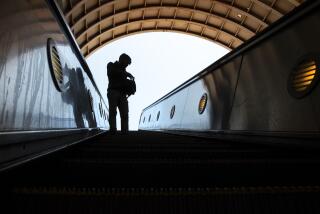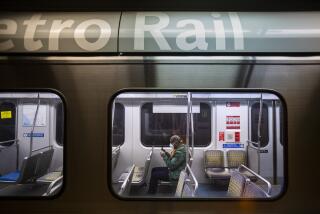Look Closer at Expenses, RTD Urged
Under fire for travel and other personal expenses billed to the district, top officials of the Southern California Rapid Transit District said Thursday that they need to tighten accounting procedures and might place limits on their own meal and hotel costs. “I don’t think we’ve been doing anything wrong,” RTD board President Jan Hall told a news conference at the transit district’s downtown headquarters. “But I think we need to beef up (accounting controls). . . . We’ve not done enough.”
Hall, whose comments were later endorsed by RTD General Manager John Dyer, said she will recommend a new policy requiring more detailed written explanation by the board of directors’ members on the purpose of travel, entertainment, personal secretarial services and other expenses that have cost nearly $270,000 since 1984.
Expense Account Limits
She said the RTD may adopt the same expense account limits that are imposed on Los Angeles County officials. This and the other recommendations to hold down executive-level costs will be presented to the board at its next regular meeting.
News reports Thursday said RTD officials had traveled to London, Paris, Tokyo and Singapore, had run up large tabs at expensive restaurants and had not filed explanations for many expenditures.
County Supervisor Kenneth Hahn called for reforms that would ensure “total accountability” of RTD officials’ expenses. “(RTD) riders will be asking if bus fares should go up” when transit officials appear to be spending freely, Hahn said.
Dyer said Thursday that a $1,145 billing from the Bonaventure Hotel was not for a dinner, as stated in one news report, but for a four-day stay at the hotel when he was hosting an annual national conference of transit officials.
$2,386 Dinner Party
Former RTD President Mike Lewis said that a $2,386 charge at a Beverly Hills restaurant in 1984 was for a dinner party for about 30 people, including top U.S. transit officials, community leaders and business leaders. The purpose was to show budget-conscious Reagan Administration officials that there was community support for the Los Angeles Metro Rail transit system.
Lewis and Hall both defended such lobbying expenses, saying that RTD recently won federal financing for the first $1.25-billion segment of the project.
The board Thursday also approved a hotly debated issue of how riders will pay their fares on Metro Rail. On a 7-4 vote, the directors decided to use a so-called “honor” system of boarding trains--meaning that only a proportion of passengers will be checked for tickets by roving RTD employees. Citations would be issued to those without tickets, although RTD staff estimated less that 3% of riders would try to cheat and fines of up to $50 would make up most of the loss.
The honor system, used by a number of large European transit systems and a growing number of U.S. cities, would save more than $6 million in equipment costs on the first segment and several hundred thousands dollars a year in operating expenses, RTD staff members said.
More to Read
Sign up for Essential California
The most important California stories and recommendations in your inbox every morning.
You may occasionally receive promotional content from the Los Angeles Times.









